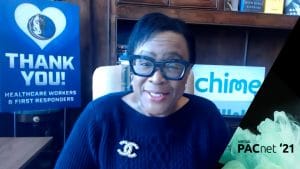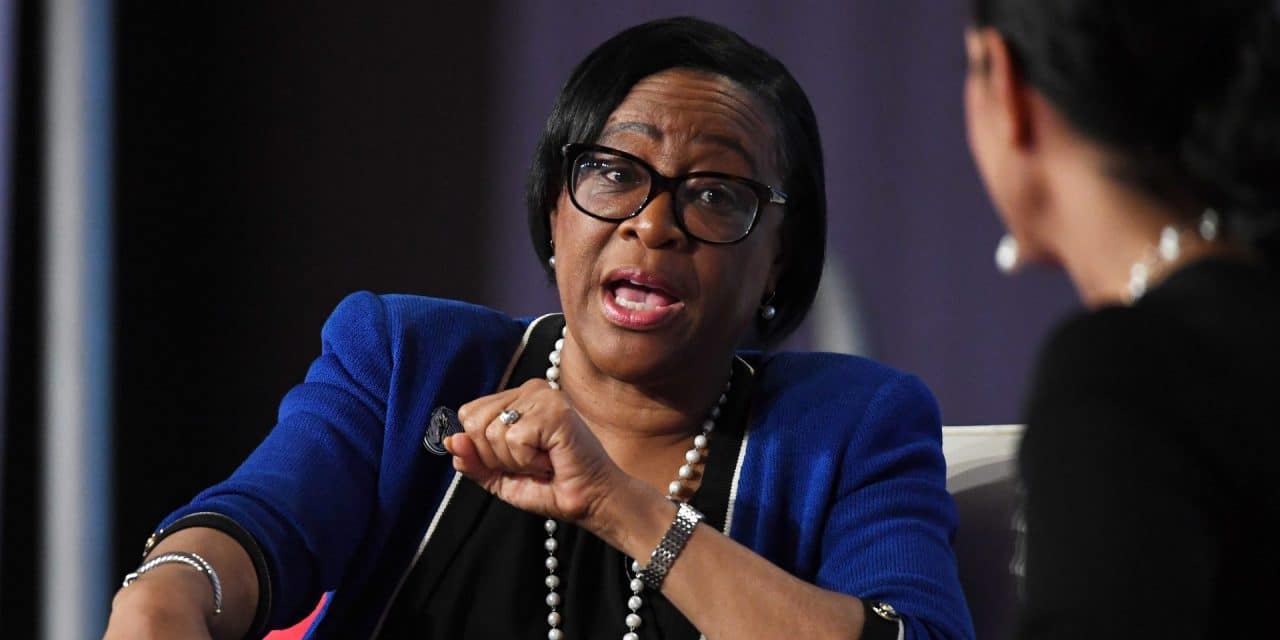POWER PLAYER: Dallas Mavericks CEO Cynt Marshall speaks at the Black Enterprise Women of Power Summit on March 1, 2019, in Las Vegas. (Getty Images)
Mavericks CEO Cynt Marshall on diversity, inclusion, and the importance of getting them both right
Dallas Mavericks CEO Cynt Marshall describes herself as a die-hard Cal Bears fan.
She was one of the first black cheerleaders at the University of California, Berkeley, and may well have been the first. She spent her 20th birthday at chilly Giants Stadium in East Rutherford, New Jersey on Dec. 15, 1979, when Cal lost to Temple 28-17 in the second annual Garden State Bowl. The Cal fight song is her cellphone ringtone, and if she dies before her husband, he is under orders to have the Cal Marching Band play at her funeral.
It’s fitting then that she was interviewed by Cole Gahagan, president and CEO of Learfield IMG College, a company known for its many collegiate clients (including Cal), for a keynote address at last month’s Pacnet ’21 virtual conference.
Marshall, who joined the Mavericks in 2018 after 36 years with Pacific Bell/AT&T, was born in Birmingham, Alabama. Her mother was a congregant of the 16th Street Baptist Church, which was bombed in 1963, resulting in the deaths of four schoolgirls, but by then Marshall’s parents had moved the family to the East Bay Area just outside Berkeley.
She and her family endured crime in and around the Easter Hill public housing project where she lived and domestic violence at home at the hands of her father, who once broke Marshall’s nose. When she went to school with a brace on her nose, her principal and some teachers learned what happened and offered support.
“I had a uniformed police officer take me to school in the seventh grade because chaos broke out in my family,” Marshall recalled. “My father had to respond in self-defense to a violence issue. So, I’ve seen a lot and fortunately the village just wrapped around my mom, wrapped around us. I was taught that education was my ticket out, whatever that meant. I didn’t know what that meant when I was a kid, but it meant out of poverty and the situation I was in.”
Marshall said she received five college scholarship offers but chose Cal because she wanted to be close to home and those who had taught her to dream big and focus on her goals, “not because it is the No. 1 institution in the world.”
“I stepped on the Berkeley campus and I’ll never forget it,” she said. “I’m 17 years old, growing up in the projects but again, had access to a wonderful education, wonderful teachers who exposed me to all kinds of things and just ended up in all these leadership positions in high school and all that, and then I step onto Berkeley’s campus and so there’s the big Sather Gate, the Campanile (bell tower) — everything was just so big. The buildings were big. And it was kind of my moment where I just said, ‘You know what? I gotta be big.’”
Upon graduation, she selected Pac Bell/AT&T out of 13 job offers.
When AT&T bought BellSouth and Cingular Wireless in 2006, Marshall was offered a position in North Carolina, where she spent 6 ½ years before being offered a position at AT&T headquarters in Dallas. The offer came via phone call while Marshall was at a Golden State Warriors game, she recalled.
Company leadership was looking to transform its corporate culture, which was fragmented as AT&T grew by acquisition, and wanted it to be more people-focused and inclusionary, Marshall said.
One thing that made her uniquely qualified to help achieve that goal was having worked in positions from engineering to human resources to government relations. That came about, she says, because she was open to go where her career was taking her, something she advises people, especially young college graduates, to embrace.
So she moved with her family to Dallas, without hesitation.
“Fortunately, that experience of those last five years, of being the senior vice president of human resources and also the chief diversity officer, put me in a position where I worked on true transformation of cultures,” she said.
She was tasked with getting AT&T on Fortune’s Great Place to Work list and examined data that Great Place to Work CEO Michael Bush supplied.
“He laid out all this information that our company had been receiving all these years that some of us had paid attention to in our own isolated business units, but as a company we didn’t have a global effort around addressing a lot of the things that our employees had been telling us,” she said, adding that “there was a valid reason why we had not made (the list).”
She returned to headquarters determined to change things by digging deep into issues that employees wanted addressed and identifying what kinds of measures could be taken to make AT&T “really create a great place to work for people, a place where we are really focusing in on individuals, a place where people can be their authentic selves, a place that focuses on diversity, equity and inclusion, a place with values.”
“We pulled together a team and right before I retired we actually made Fortune’s 100 Great Places to Work list,” she said.
She said that last phase of her work with AT&T truly prepared her for what she is doing now with the NBA’s Mavericks. Team owner Mark Cuban (she didn’t know who he was when he called) sought to transform his own company culture, which had been cast in a decidedly unfavorable light in a blistering 2018 expose by Sports Illustrated that saw a number of then-current and ex-employees detail an allegedly hostile work environment. Marshall came out of retirement and joined the Mavs in March of that year.
Asked by Gahagan to share some of the lessons she learned while working to improve the culture at AT&T that also served her in her current position, Marshall said it’s not enough to focus on diversity in terms of numbers and making a few promotions here and there. There must also be “a journey around inclusion.”
“There is a difference between diversity and inclusion and to really transform cultures and create a great place to work, you have to know the difference and you have to focus on both,” she said. “Diversity is about the mix. It’s about the numbers. Most of our diversity you can see. Some of it you can’t, but most of it you can. Inclusion is about, What do you do with that mix? Diversity is about counting the numbers. Inclusion is about making the numbers count.”
One of Marshall’s favorite adages: “Diversity is being invited to the party. Inclusion is being asked to dance.”
“You can’t promote me and sit me at the table and have me as your one black person or your one woman and not teach me the rules of engagement, not teach me what really happens at that table, not acclimate me to the dance moves or whatever and just kind of have me on the sidelines not being able to participate,” she said. “To create a great place to work, you’ve got to make sure that I can participate and my voice has to be welcome. It has to be a place where my voice is heard.”
As for equity, Marshall said offering equality of opportunity is essential, but consider that people are starting from different places.
She and Gahagen harkened to two juxtaposed images making the internet rounds of three people of different heights trying to watch a ball game from behind a fence. In one, labeled “equality,” all three are standing on similar sized boxes, but only the two tallest can see over the fence. In the other image, labeled “Equity,” all three can see the game because the tallest needs no box, the middle person is standing on one box and the third and shortest is standing on two stacked boxes.

SHE’S A MAVERICK: Marshall gives the keynote address at Paciolan’s Pacnet ’21 virtual conference in February. (Courtesy Paciolan)
“We have to focus on what people need,” Marshall said. “How do we meet people where they are? Sometimes it’s about sameness, but more often, it’s about fairness.”
Marshall said she also learned the value of employee engagement and using resource and affinity groups to bring people together to work on causes and business results.
“What I also learned is just the true business case for employee engagement and diversity,” she said. “When you have employees engaged, customer service is better, you get a better mix of your fan base. You’re more profitable when you have a diverse group of people at the table.”
Another lesson: “How difficult it is to transform and institutionalize inclusive cultures, especially when you have to purge an old culture.”
Cultures drive organizations, she said.
“You can have the best strategy, the best business plan, but if you have all these subcultures fighting against the culture around values, then you’ve got a problem.”
Having personal and company values that people can rally around is a must, she said.
“We call it at the Mavs ‘value-based employment,’” Marshall said. “I learned that when I was at AT&T.”
Marshall said she wasn’t initially keen on taking the Mavs CEO position, but after talking with some of the employees she decided that she could have an impact on the lives of people in the organization and accepted the offer.
She recalls thinking, “For some reason, I am equipped and uniquely qualified, I think, to lead this organization and to lead them out of this crisis and to help create a great place to work.”
“We put together a vision — and (it) wasn’t about basketball, it wasn’t about profitability, it wasn’t about fan base. The vision I laid out said we would set the global standard for diversity and inclusion by 2019 and this was in March of 2018.”
She laid out the company values and formulated a 100-day plan that focused on zero-tolerance, an agenda for women, cultural transformation and operational effectiveness.
“And then I had one-on-ones with every single employee within the organization,” Marshall said. “Found some wonderful people and also found some people that needed to do something else. We went from not having any women in permanent leadership positions or people of color to now I have 47% women and 47% people of color on my leadership team.”
READ ON
VenueVoices: Taneshia Nash Laird
VenueVoices: Zakiya Smith-Dore







